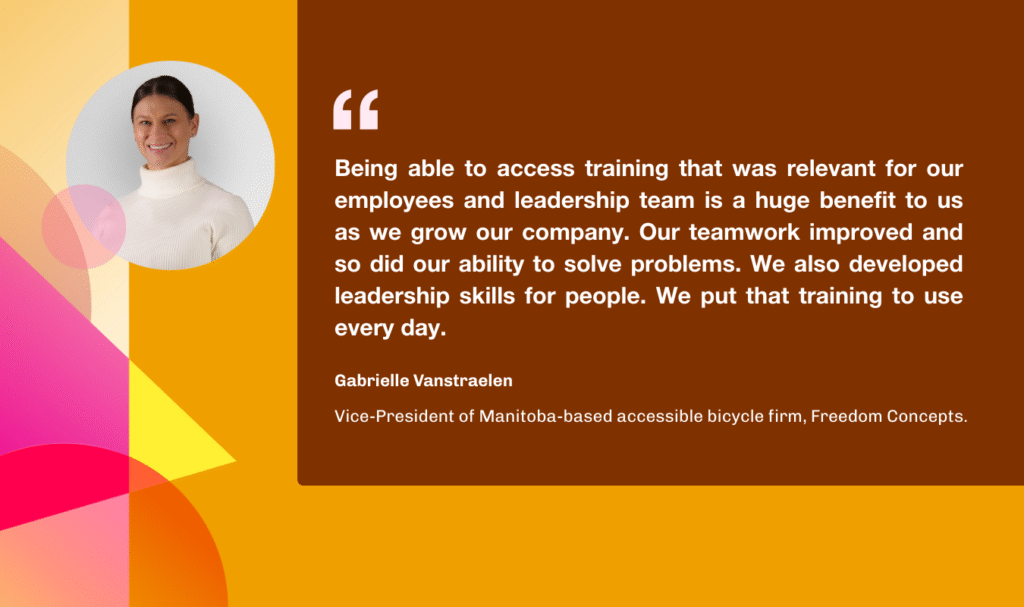Impact Story: Testing pay-for-performance incentives for employer-led training

Canadian employers invest significantly less in skills training than their counterparts in other advanced economies, and this is likely contributing to lagging productivity growth in our economy. A 2017 survey of sector employers by Excellence in Manufacturing Consortium found that only half of manufacturing employers offered workplace training in essential skills. Low rates of training investment are most frequent among small and medium size enterprises (SMEs), which comprise the vast majority of private sector employers in this country.
To address this challenge, the Future Skills Centre partnered with EMC and the Social Research and Demonstration Corporation to test a pay-for-performance model of skills training and find out whether employers could be persuaded to support delivery of training if they were partially reimbursed. Repayment would be on condition they met key performance targets and targets set for the pilot.
Employers found that the program was successful in delivering their training needs, and almost all were paid back the full 70 per cent of the eligible cost. The majority of employers who took part in the pilot said they were more likely to invest in training in the future. Despite this, many also said that if given the choice, they would opt for wage subsidies and tax credits over a publicly supported pay-for-performance training incentive.

“It was a payoff for both of us, our employees and our leadership team,” said Gabrielle Vanstraelen, Vice-President of Freedom Concepts, a family owned Manitoba-based business that customizes bicycles and tricycles for people with disabilities, including children. “We were able to improve on our teamwork, problem solving and leadership skills together and we use those skills every day to make our business better.”
Challenge: Training for growth and productivity
SMEs find it difficult to absorb the cost of training for their workers and many also feel they can’t absorb the opportunity cost of paying for staff time to train off-site. Employers can be hard to convince about the positive return on training investment and often doubt that training programs align well with their needs. All of this results in a lower level of employer-led training that could jeopardize Canada’s competitiveness.
But many employers are open to customized training at a lower cost to them.
Solution: Reimbursing employers for the cost of training
The proposed solution was a pay-for-performance model of skills training designed with direct input from employers and a review of best practices in the design and implementation of pay-for-performance models.
The model reimbursed employers for up to 70 per cent of the $3,000 cost to train each worker as well as up to $1,200 in compensation for lost productivity as the worker took the time to train. To get the reimbursement, employers had to demonstrate engagement and support for sound delivery of the program. They also had to demonstrate that there had been an uptick in skills as a result. More than 55 companies took part and more than 200 people were trained in this initial phase.
“We’re a family-built business that’s grown so much in seven or eight years, almost doubling in size of employees,” says Freedom Concept’s Operations Manager, Dirk Hollar. “We need to implement processes now and train people to be able to take our company to the next level. We need to make sure the training fits and that it’s consistent so we’re all growing together.”
Lessons and future outlook:
The pilot showed strong results. 96 per cent of people who took the training received certification. The pilot registered a 87 per cent success rate in terms of gains in worker skills, and 96 per cent of employers met the threshold for engagement, meaning EMC confirmed that all program requirements are met by the participant. Some 93 per cent of the total amount eligible for reimbursement was returned to employers. And, most importantly,90% of employers said they would be more likely to invest in training and offer training programs to their employees as a result of the experience. Almost eight in 10 said they recognized the return on this investment.
Over at Freedom Concepts, Gabrielle says the investment in training through EMC was absolutely worth it and that everyone who took the program moved on to a leadership role. “They reference the training in their work and we continue to see them develop each year,” she says. “I’m trying to identify the next people who will need that training opportunity in hopes that we’ll see the same results for another cohort.”
Based on this success, Future Skills Centre is supporting the expansion and evaluation of the model in new sectors, including food processing, biotechnology, and environmental industries, and deepening its impact by tying incentives to comprehensive employer behaviors like pre-training planning and continuous learning.
The views, thoughts and opinions expressed here are the author’s own and do not necessarily reflect the viewpoint, official policy or position of the Future Skills Centre or any of its staff members or consortium partners.




